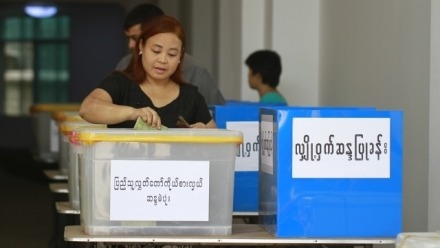SPIR academic returns from monitoring Myanmar’s historic election

On 8 November, millions of people voted in Myanmar’s first national multi-party elections in decades. School of Politics and International Relations’ lecturer Richard Frank was there as a short-term election observer for the US-based Carter Center. Dr. Frank was part of a ten-day short-term mission to observe and evaluate the integrity of Myanmar’s electoral process. He was deployed to mountainous Tedim, Chin State, a remote impoverished region of western bordering India. Dr. Frank watched remote rural polling stations opening before dawn, voting processes at a number of polling stations, and votes being counted and tabulated well into the early hours of the next day.
“The stakes were high for all sides,” Dr. Frank says, “and domestic and international monitoring organizations played an important role in neutrally evaluating a new and largely untested electoral process.” The outcome was unsure as there were no reliable opinion polls before the election.
Overall, election day was peaceful, and turnout was high with many people voting for the first time.
Nobel Prize winner Aung San Suu Kyi’s National League for Democracy (NLD) won 77% of the available seats in parliament, enabling the NLD to choose Myanmar’s next president. While Ms. Suu Kyi is barred by the 2008 constitution from serving as president, she has stated that if the NLD won a majority she would be “above the president”.
A preliminary statement by the Carter Center suggested that “Myanmar appears to be on a positive trajectory toward a peaceful, democratic transition” from five decades of military rule.
Nevertheless, Myanmar’s transition to democracy is far from complete. The nation’s military still holds significant political power through constitutionally protected legislative seats, control over three crucial ministries (defence, home affairs, and border affairs), and de facto veto power over any constitutional changes.
Additionally, up to a million people including those from the Rohinga and other ethnic minorities, people in conflict zones, and the clergy were not allowed to vote.
Myanmar also face a number of security challenges. While the military government signed an historic ceasefire agreement with eight ethnic armed groups several weeks before the election, a number of other groups have yet to lay down their weapons, and fighting has continued after the election in several states.
These political and security challenges drive Dr. Frank’s research interest in Myanmar. One of his current (ARC-funded) research projects examines the integrity of electoral processes and the use of violence in post-conflict countries.
“Being able to evaluate such an historic election,” Dr. Frank stated, “enabled me to witness first hand the inherent difficulties involved in conducting a foundational election in areas with limited state capacity, difficult terrain, and a history of separatist violence.”








